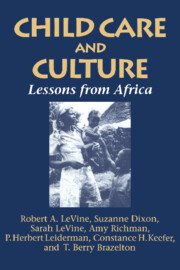Book contents
- Frontmatter
- Contents
- List of tables and figures
- Foreword
- Acknowledgments
- Introduction
- Part I African infancy: Frameworks for understanding
- Part II Parenthood among the Gusii of Kenya
- Part III Infant care and development in a Gusii community
- Part IV Interpretations
- Appendix A Fieldwork procedures: Initial phases and planning
- Appendix B Coding categories for spot observations
- Appendix C Blankhart Nutrition Questionnaire
- Appendix D Temperament Assessment Method
- Appendix E Coding categories for narrative observations
- Appendix F Coding categories for face-to-face interaction
- Appendix G Coding categories for maternal teaching task
- Appendix H Supplementary tables
- Notes
- References
- Index
- Plate section
Foreword
Published online by Cambridge University Press: 11 May 2010
- Frontmatter
- Contents
- List of tables and figures
- Foreword
- Acknowledgments
- Introduction
- Part I African infancy: Frameworks for understanding
- Part II Parenthood among the Gusii of Kenya
- Part III Infant care and development in a Gusii community
- Part IV Interpretations
- Appendix A Fieldwork procedures: Initial phases and planning
- Appendix B Coding categories for spot observations
- Appendix C Blankhart Nutrition Questionnaire
- Appendix D Temperament Assessment Method
- Appendix E Coding categories for narrative observations
- Appendix F Coding categories for face-to-face interaction
- Appendix G Coding categories for maternal teaching task
- Appendix H Supplementary tables
- Notes
- References
- Index
- Plate section
Summary
This book is about cultural lessons from Africa and from the United States, and what each culture can learn from the other about the forces that shape human character. It offers lessons not only for contemporary developmental science but also for today's societies on both continents. These scientific and social lessons are especially timely, for although some of them were learned – and taught – years ago, in recent decades they have gone out of fashion. Yet, as I shall suggest here, American society may need these lessons more today than ever before in its history.
What has gone out of fashion is summarized in a single word, a concept that from the 50s to the early 70s dominated the study of human development across disciplines in psychology, sociology, and anthropology. That key construct is socialization, defined as “the process through which individuals acquire the knowledge, skills, and dispositions that enable them to participate as more or less effective members of groups and the society.” In 1969, an entire handbook of more than 1,000 pages was published on theory and research pertaining to this subject. But from today's perspective, socialization is no longer of commanding research interest. In the words of a leading contemporary scholar of human development: “After peaking during the 1960s and early 70s, socialization studies began to decline in all areas.”
Yet, socialization is exactly what this new book by Robert A. LeVine and his colleagues is all about.
- Type
- Chapter
- Information
- Child Care and CultureLessons from Africa, pp. xi - xviiiPublisher: Cambridge University PressPrint publication year: 1994
- 1
- Cited by

